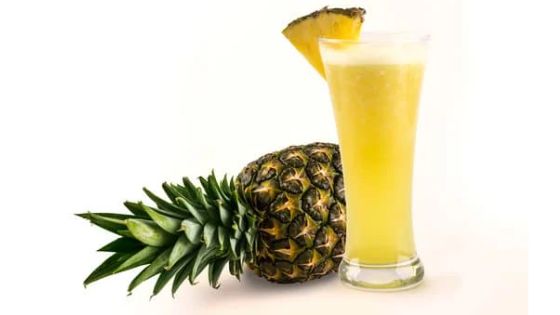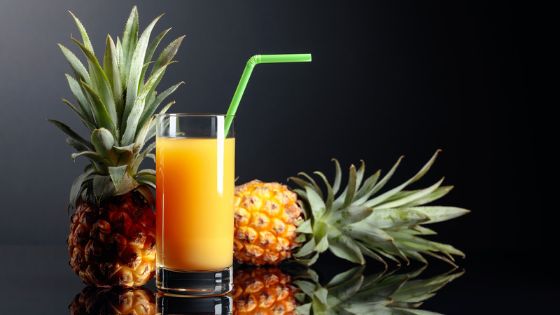How much pineapple juice will cause a miscarriage?

How much will pineapple juice cause a miscarriage? No scientific evidence indicates that drinking pineapple juice can cause a miscarriage. There has not been a lot of research on how pineapple affects human pregnancy. This means we do not know if there is a connection between the two.
While pineapple may not be hazardous or serve as a magic potion to bring your baby early, consuming large amounts can result in uncomfortable side effects. So if you have a delicate stomach, it is best to exercise caution when eating this tasty fruit!
The acids present in pineapple can result in painful heartburn and reflux symptoms, so it is highly advisable to consume this succulent fruit in small portions.
While it's true that large amounts of vitamin C can increase a woman's risk for miscarriage, regular consumption of small-to-moderate amounts of pineapple juice is unlikely to cause any harm.
It's best to talk with your doctor about eating or drinking anything while pregnant, as different women may have different sensitivities and risks.
Is eating pineapple a good choice during pregnancy?

Yes, eating pineapple during pregnancy is undoubtedly a good choice. Pineapple is an excellent source of vitamins and minerals such as vitamin C, manganese, copper, and dietary fiber.
It also contains a unique combination of enzymes that may help with digestion.
Eating this fruit can also give your baby essential antioxidants, which can help protect the developing immune system.
Additionally, pineapple is low in calories and carbohydrates while being rich in folate — an essential nutrient for pregnant women that helps form new tissue cells and aids fetal development.
Furthermore, the bromelain enzyme found in pineapple has anti-inflammatory properties that can reduce swelling or improve joint health — common issues during pregnancy.
Thus, adding pineapples to your diet provides many essential nutrients for you and your unborn child!
Other healthy fruits to include in your diet during pregnancy
In addition to pineapple, many other delicious and nutritious fruits can be included in a diet during pregnancy.
Oranges
For example, oranges are an excellent source of vitamin C, essential for the baby's growth and development and the mother's immune system. Oranges also contain folate (vitamin B9), which helps to create new cells and prevent specific congenital disabilities.
Raspberries
Raspberries provide plenty of fiber, vitamins A, C, E, and K, and magnesium that may help reduce fatigue associated with pregnancy.
They also have polyphenols, which are plant compounds known to improve health. In addition, since they are high in antioxidants, they can help protect against free radicals, which can harm both mother and baby during this critical time.
Bananas
Bananas are packed with potassium, folic acid, and vitamin B6, all essential nutrients for pregnant women.
They also contain calcium to strengthen bones and teeth during pregnancy and phosphorus, which helps with the proper functioning of cells.
The natural sugar in bananas provides energy without spiking blood sugar levels like refined sugars often do.
Apples
Apples are high in fiber, folate, vitamin C (all necessary for pregnant women), and iron to form red blood cells.
They also have antioxidant properties that can fight inflammation caused by pregnancy hormones.
Finally, apples provide pectin, which helps eliminate toxins from the body, a bonus both during pregnancy and after delivery!
Mangoes
They are packed with vitamins A, C & E and naturally-occurring carbohydrates that give moms-to-be extra energy when needed.
Mangoes contain folate for helping form red blood cells; potassium for aiding nerve function; magnesium; copper; beta carotene; iron; calcium: some B vitamins: zinc: selenium: and phosphorus. All these are necessary components of a healthy diet during pregnancy.
Blueberries
Blueberries have many nutritional benefits for pregnant women. They are high in vitamins A and C, dietary fiber, and potassium. These nutrients help with digestion and provide the mom-to-be with essential antioxidants that she needs during her pregnancy.
Antioxidants help protect against cell damage from increased stress levels associated with carrying another human being inside her womb!
The bottom line
Pineapple should be perfectly safe during pregnancy when eaten in moderation. However, it is always best to consult a doctor before consuming anything while pregnant.
This article is only meant to provide general information and should not replace the advice of your physician or another medical professional.
Always consult your doctor before changing your diet or lifestyle during pregnancy.
If you are concerned about the effects of eating pineapple on your pregnancy, speak with your healthcare provider for specific advice tailored to your health needs.
DISCLAIMER: buildyourbody.org does not provide medical advice, examination, or diagnosis.
Medically reviewed and approved by Nataniel Josue M D.
